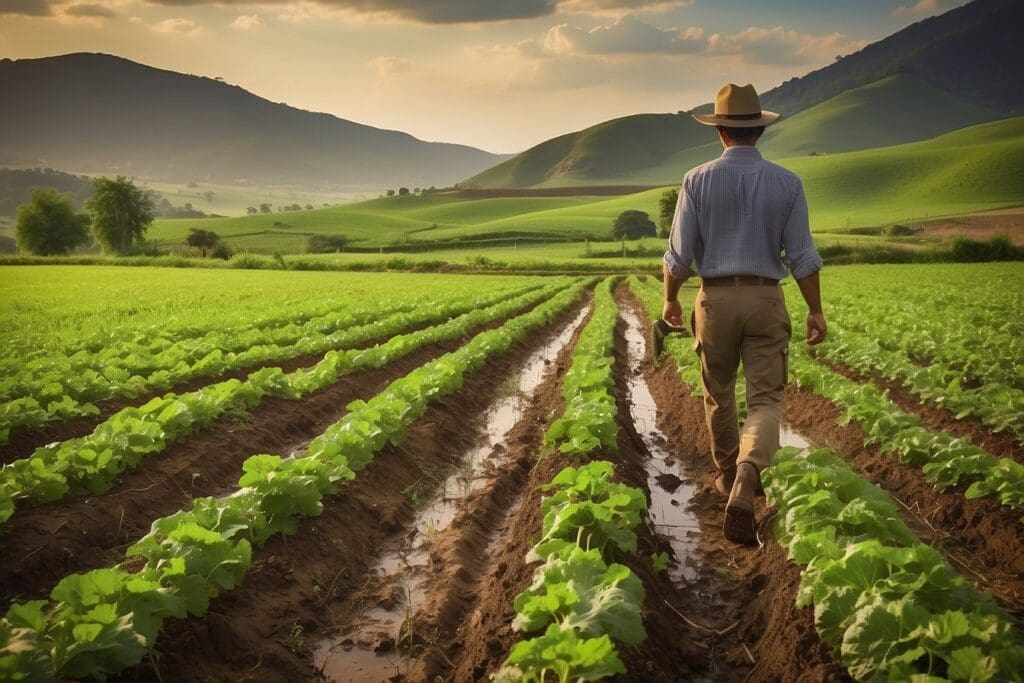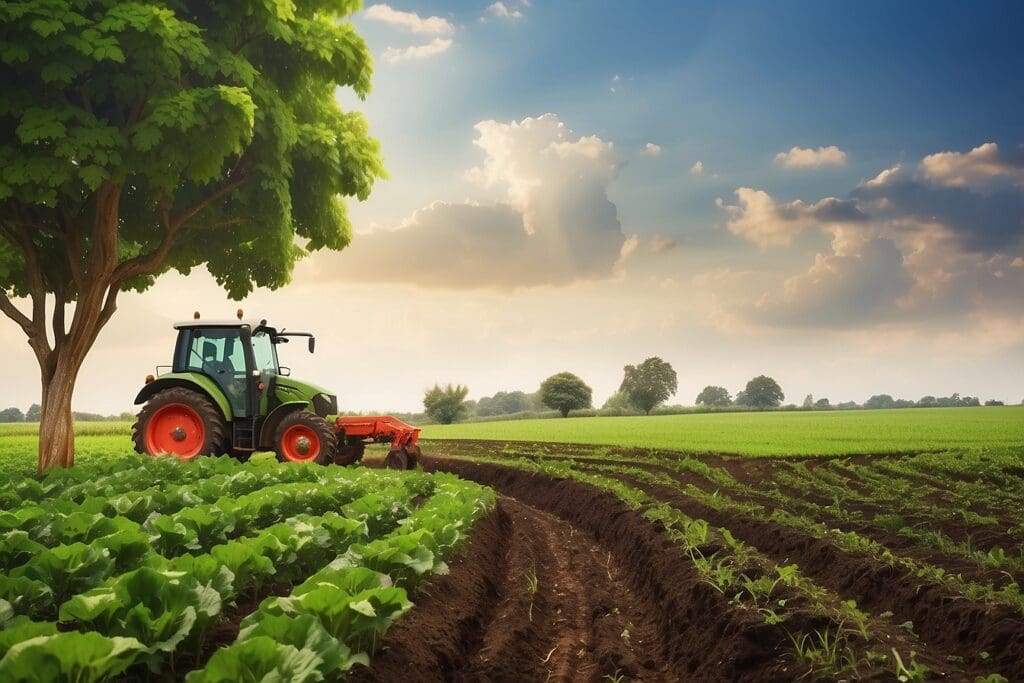Businesses everywhere are searching for ways to thrive while safeguarding our planet’s future. Sustainable agriculture offers a path to environmental stewardship that can also boost profits and productivity.
This article will explore how adopting sustainable farming practices can lead not only to a healthier environment but also to tangible business benefits and opportunities. Let’s dig in and discover the green potential of eco-friendly farming!
Key Takeaways
- Sustainable agriculture helps businesses cut costs by reducing the need for chemical fertilisers and pesticides, and decreasing energy consumption.
- Adopting eco – friendly farming practices can boost a business’s reputation, attracting customers who value environmental stewardship and ethical production.
- Technological advancements such as precision farming and renewable energy sources are pivotal in modernising agriculture for enhanced sustainability and efficiency.
- Through sustainable methods like integrated pest management and crop rotation, businesses contribute to pollution prevention and conservation of resources.
- Sustainable agricultural practices support rural communities by creating jobs, ensuring food security, promoting social equality, and preserving local culture.
Importance of Sustainable Agriculture
Sustainable agriculture is essential for environmental protection, biodiversity, and resilient food systems. It also promotes soil fertility, habitat preservation, and watershed protection while reducing pollution and conserving energy resources.
Increased biodiversity
Increased biodiversity is a shining star in the galaxy of sustainable agriculture benefits. It refers to the variety and variability of life within an ecosystem, farm or region. By growing a diverse range of crops, farmers create habitats for different species—both plants and animals.
This approach strengthens ecosystems, improves soil health, and contributes to more resilient food systems capable of withstanding pests and changing climate conditions.
Farms that focus on biodiversity also help in protecting watersheds, preserving natural habitats, and fostering beneficial insects that serve as natural pest control. These practices reduce reliance on harmful pesticides and fertilisers that can damage the environment.
In this way, businesses engaging in ecofriendly agriculture not only support conservation efforts but also align themselves with ethical business practices sought after by environmentally conscious customers.
Sustainable livestock management
Livestock management practices play a vital role in sustainable agriculture, contributing to environmental conservation and economic stability. Implementing responsible grazing techniques and ensuring animal welfare are fundamental aspects of sustainable livestock management.
By employing rotational grazing methods and providing access to natural forage, farmers can improve soil health while reducing the need for chemical fertilisers. Additionally, proper waste management prevents water pollution and minimises greenhouse gas emissions.
Furthermore, implementing initiatives such as pasture-based systems decreases dependency on fossil fuels and lowers operational costs for farmers. Promoting ethical treatment of animals aligns with consumers’ increasing demand for ethically sourced products, fostering sustainable business growth within the agricultural sector.
Lower expenses
Implementing sustainable agriculture practices can lead to significant cost savings for businesses. By reducing the need for chemical fertilisers and pesticides, as well as lowering energy consumption, businesses can cut down on operational expenses.
Additionally, embracing sustainable livestock management techniques can result in decreased veterinary costs and feed expenditure, contributing to overall financial savings.
Now let’s explore how sustainable agriculture supports pollution prevention and conservation of energy resources.
Pollution prevention
Sustainable agriculture plays a crucial role in pollution prevention. By reducing the use of harmful chemicals and pesticides, sustainable farming practices help to minimise water and air pollution.
Implementing organic farming techniques also reduces the risk of soil contamination, protecting both the environment and public health. Utilising crop rotation and cover cropping helps control pests naturally, eliminating the need for chemical interventions that contribute to pollution.
Incorporating sustainable livestock management further contributes to pollution prevention by managing animal waste responsibly. By adopting these sustainable agricultural methods, businesses can actively play a part in preserving environmental quality while promoting healthy ecosystems and communities.
Conservation of energy resources
After addressing pollution prevention, another crucial aspect of sustainable agriculture is the conservation of energy resources. By implementing sustainable farming practices such as crop rotation and organic fertilisers, businesses can reduce their reliance on fossil fuels for production and transportation.
Utilising renewable energy sources like solar or wind power further contributes to conserving energy resources and minimising carbon emissions in agricultural operations.
Optimising energy use through efficient irrigation systems, machinery, and building designs is also integral to sustainable agriculture. Implementing these measures not only benefits the environment but also enhances long-term profitability for businesses by reducing operating costs and mitigating the effects of climate change.
Protection against soil degradation
Sustainable agriculture practices protect soil against degradation, preserving its fertility and ability to support healthy crop growth. By minimising the use of chemical fertilisers and pesticides, sustainable farming maintains the natural balance of nutrients in the soil, promoting long-term agricultural productivity.
Crop rotation and cover cropping techniques further contribute to preventing erosion and maintaining soil structure, ensuring a more resilient and sustainable agricultural landscape.
These environmentally friendly practices also reduce the risk of water pollution from runoff, safeguarding both natural ecosystems and human health.
Support for rural communities
Sustainable agriculture offers substantial support to rural communities. By promoting environmentally friendly farming methods, it provides opportunities for small-scale farmers and contributes to local economic development.
Additionally, sustainable agriculture fosters community resilience by enhancing food security and supporting livelihoods in rural areas. Ultimately, this approach plays a vital role in preserving traditional farming practices and strengthening the social fabric of rural communities.
Moreover, sustainable agricultural practices can help mitigate urban migration by creating new employment prospects within rural areas. This supports socioeconomic sustainability while maintaining the cultural heritage of these regions.
Promotion of social equality
Sustainable agriculture promotes social equality by providing fair working conditions and opportunities for farmers, regardless of their background. It encourages inclusive practices that aim to uplift rural communities and support small-scale farmers.
This approach fosters a more equitable distribution of resources and benefits within the agricultural sector, contributing to a more balanced and just society.
Implementing sustainable farming techniques helps bridge the gap between different socio-economic groups by creating employment opportunities, promoting gender equality, and ensuring access to resources for all members of the community.
Sustainable Agriculture as a Business Opportunity

Businesses have the opportunity to modernise and benefit from sustainable agriculture practices while also positively impacting the environment and society. Implementing sustainable practices, using technology, and aligning with green business initiatives can lead to long-term profitability.
Modernising agriculture
To modernise agriculture, businesses can embrace technological advancements to automate processes and improve efficiency. Integrated systems for crop monitoring, irrigation management, and soil health analysis can lead to higher productivity while reducing resource wastage.
By adopting precision farming techniques using drones and satellite imagery, businesses can ensure optimal use of land and resources for sustainable practices. Embracing digital platforms for marketing and distribution also opens up new markets for agricultural products, supporting both economic growth and environmental sustainability.
In addition to technology adoption, businesses should focus on diversifying their product offerings through value-added processing or incorporating renewable energy solutions into their operations.
Benefits for businesses
Sustainable agriculture offers numerous benefits for businesses. It provides a competitive edge while also contributing to a positive environmental and social impact.
- Enhancing Reputation: Implementing sustainable agriculture practices can enhance a business’s reputation, attracting environmentally conscious consumers and stakeholders.
- Cost Savings: Sustainable farming techniques can lead to reduced expenses, such as lower water and energy usage, resulting in long-term cost savings.
- Access to New Markets: Businesses that embrace sustainable agriculture can gain access to niche markets that prioritise eco-friendly and ethically produced products.
- Compliance with Regulations: Adhering to sustainable agricultural practices ensures compliance with environmental regulations, diminishing the risk of fines or legal issues.
- Risk Mitigation: Embracing sustainable agriculture minimises the risk of supply chain disruptions by promoting biodiversity and reducing dependence on external resources.
- Long-term Profitability: By investing in sustainable agriculture, businesses can secure long-term profitability through efficient resource management and resilient farming methods.
Implementing sustainable practices
To implement sustainable practices:
- Integrate crop rotation to maintain soil fertility and prevent disease.
- Use cover crops to reduce erosion and improve soil health.
- Embrace agroforestry to enhance biodiversity and carbon sequestration.
- Employ precision agriculture techniques for efficient resource use.
- Adopt organic farming methods to minimise chemical usage and protect ecosystem balance.
- Install renewable energy sources like solar panels or wind turbines for clean power generation.
- Implement water – saving irrigation systems to conserve this vital resource.
The role of technology
Transitioning from implementing sustainable practices to the role of technology, it is evident that technological advancements play a crucial part in sustainable agriculture. Innovations such as precision farming, use of drones for crop monitoring and advanced irrigation systems are enhancing the efficiency and sustainability of agricultural operations.
These technologies not only reduce environmental impact but also help businesses improve productivity and profitability while promoting resource conservation.
Technology also allows for the development and implementation of smart farming solutions that enable better management of resources like water, land, and fertilisers. Additionally, modern machinery powered by renewable energy sources enables reduced carbon emissions while carrying out essential farm tasks.
Examples of Successful Sustainable Agriculture Businesses

Innovating with renewable energy, implementing sustainable pest control, and showcasing successful stories in sustainable agriculture. To learn more about how businesses can benefit from sustainable agriculture practices, keep reading.
Integration of renewable energy
Sustainable agriculture businesses are integrating renewable energy sources such as solar and wind power to reduce reliance on non-renewable resources. By using these eco-friendly energy solutions, farms can significantly lower their carbon footprint while cutting electricity costs.
Implementing renewable energy systems also aligns with the social impact of sustainable agriculture, showcasing a commitment to environmental stewardship and responsible resource management.
Innovative technologies play a crucial role in this integration process, enabling farms to harness clean energy efficiently. Sustainable agriculture is not just a farming practice; it’s part of a larger movement towards long-term profitability and corporate social responsibility.
The successful incorporation of renewable energy into agricultural operations sets an inspiring example for other businesses seeking environmentally friendly practices.
Sustainable pest control
Moving from the integration of renewable energy to sustainable pest control, it’s crucial for businesses in agriculture to adopt environmentally friendly methods to manage pests. Sustainable pest control focuses on natural and non-toxic solutions, such as using beneficial insects or biopesticides, which can effectively reduce crop damage without harming the environment.
Implementing integrated pest management techniques reduces reliance on chemical pesticides and promotes a healthier ecosystem by preserving beneficial organisms like pollinators and soil microorganisms.
Businesses that prioritise sustainable pest control contribute to a more balanced and resilient agricultural system while aligning with environmental conservation efforts.
Success stories in sustainable agriculture
Sustainable agriculture has led to inspiring success stories in various parts of the world. These businesses have shown that environmentally friendly practices can also be highly profitable. Here are some examples:
- A farm in the UK integrated renewable energy sources like solar and wind power, significantly reducing its reliance on non-renewable energy.
- A vineyard in California adopted sustainable pest control methods, such as introducing natural predators for pests, resulting in healthier crops without relying on harmful chemicals.
- In India, a cooperative of small – scale farmers embraced sustainable agriculture techniques and experienced increased yields while preserving the local ecosystem.
- An organic dairy farm in New Zealand prioritised soil health and biodiversity by rotating livestock, which boosted both production and environmental conservation efforts.
- Lastly, a family – run farm in Brazil successfully implemented agroforestry practices, incorporating trees into their farming system to enhance sustainability and productivity.
Conclusion
In conclusion, sustainable agriculture offers numerous benefits for businesses, including increased biodiversity and lower expenses. By implementing sustainable practices and leveraging technology, businesses can modernise agriculture while protecting the environment.
Successful examples in renewable energy integration and sustainable pest control demonstrate the profitability of sustainable agriculture in today’s business landscape.
FAQs
1. What are the environmental benefits of sustainable agriculture for business?
Sustainable agriculture helps businesses reduce their environmental impact by using practices that protect soil, water, and biodiversity.
2. Can sustainable farming improve a business’s profitability in the long term?
Yes, adopting sustainable agricultural practices can lead to economic advantages by reducing costs and increasing efficiency, ultimately boosting long-term profitability.
3. How does sustainable agriculture contribute to food security?
The role of sustainable agriculture is crucial in food security as it ensures a steady supply of healthy food while preserving natural resources for future generations.
4. Are there any disadvantages to implementing sustainable farming methods in my business?
While the benefits include both environmental and economic gains, transitioning may involve challenges such as initial costs or learning new techniques before experiencing the full advantages of agricultural sustainability.



